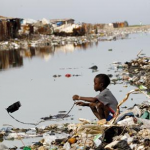Perhaps more so than in any election in recent memory, the two major party presidential candidates have shown a shocking willingness to abandon the truth at a moment's notice. Twitter was ablaze after it was announced that Hillary Clinton and Donald Trump answered the questions posed by Science Debate 2016. But considering their inconsistencies, how seriously should we take their answers?
Policy & Ethics
Perhaps the most problematic classification system in the scientific community is that of the impact factor, which attempts to rank journals by their relative importance. This factor for a particular journal is equal to the average number of times an article in the journal is cited in a given year. While this sounds useful, in practice, it has been a slow-motion train wreck.
The "follow the money" argument is an intellectually lazy fallacy. However, if you really do think that money will change our minds, then write us a check.
In 1960, a Boeing mechanic was told he had renal failure – a death sentence. But he was started on an experimental technique – dialysis – which extended his life for 11 years and made him Patient Zero in this revolutionary area in health care. Today, Medicare spends more than $10 billion on dialysis, medications and laboratory testing for some 370,000 patients.
1. In America, we have the luxury of plentiful, affordable energy and full bellies - and so we have groups who are raising a billion dollars a year criticizing modern science and technology. Most media outlets just play along but UPI recently took a critical look at one topic; the claims of health effects related to modern natural gas extraction.
It's a topic we've look at with interest, but there's just nothing there, as UPI notes. Read more in Studies blaming ailments on Pennsylvania fracking are flawed
Researchers in Pittsburgh studying the effectiveness of email say that the electronic process is rife with miscommunication, exchanges between parties often have a difficult time conveying feelings properly, and most interestingly that emails among friends are no more effective than those between total strangers.
Haiti did not have a single case of cholera until October 2010 -- 10 months after a devastating earthquake leveled the country on Jan. 12 of the same year, killing up to an estimated 300,000 people.
The American Academy of Pediatrics wants to guide clinicians on “Countering Vaccine Hesitancy” among parents. This policy statement, published in the journal Pediatrics, rightly champions vaccination as "one of the greatest public health achievements of the last century." There is just one problem; pediatricians actually don't need more guidelines and protocols.
Our founder, Elizabeth Whelan, liked to remind us that "mice are not little men," and that we ought to stop banning chemicals "at the drop of a rat." Apparently, the head of the NIAID, Dr. Anthony Fauci, agrees.
No one expected the DEA to claim marijuana is medical without any studies proving it, but it surprised the research community by removing a bottleneck on supply.
While the ongoing issue for many world-class athletes -- specifically, whether to participate in the upcoming Olympics -- comes into sharper focus, we keep hearing from those who are unsettled by the idea of heading into Brazil's Zika hot zone. And with the news that a major league pitcher has recently contracted the virus, the drumbeat for athletes to potentially skip the Summer Games is getting louder. But if they take precautions, should they?
A survey by the Pew Research Center, in collaboration with the American Association for the Advancement of Science (AAAS), asked members of the public, on the one hand, and scientists associated with AAAS on the other, about a range of scientific and health issues often in the news.








